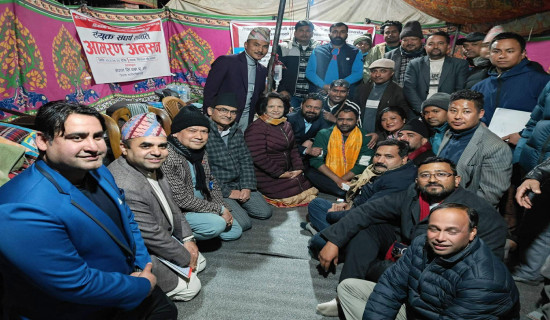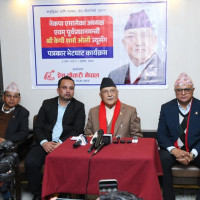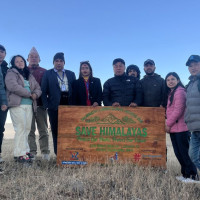- Monday, 19 January 2026
HKH meet calls for urgent climate action
By A Staff Reporter,Kathmandu, Aug. 19: President Ramchandra Paudel has said that climate change, biodiversity loss and air pollution are no longer confined to scientific reports, they have become the harsh reality of our daily lives.
Inaugurating the two-day Hindu Kush Himalaya Parliamentarians’ Meet-2025 on Monday, President Paudel said that although the rivers flowing from the Himalayas, the oxygen from our forests and the fertility of our farmlands continue to sustain the lives of over 2 billion people in this region, these very foundations of life are now under threat.
Speaking at the meet organised by the Agriculture, Cooperatives and Natural Resources Committee of the Federal Parliament, the President said that this meeting is a historic opportunity to set a roadmap for our common and sustainable future. “It is an opportunity to demonstrate a strong commitment regarding the future of the HKH region, its geography, mountains, forests, rivers and atmosphere,” he said.
He reminded participants that the future of people living from the high Himalayas to the coastal regions is closely linked and expressed hope that this historic gathering would open a path of cooperation for a shared and sustainable future.
He called for stronger laws to promote climate-friendly development, clear standards to control air pollution, and legal provisions to protect biodiversity. Parliament, he said, must ensure accountability by monitoring programmes, ensuring transparency in resources, and assessing results.
He highlighted that the Hindu Kush Himalaya region is rich in biodiversity and home to rare plants and animals, but that the loss of biodiversity is already affecting food security, cultural heritage, species survival, and even the overall economy.
Despite these challenges, President Paudel praised member states for their progress in addressing climate change, controlling air pollution, and conserving biodiversity. He cited examples such as the expansion of national parks and protected areas, modernisation of wildlife monitoring, cooperation with local communities, improvement in public transport, promotion of electric vehicles, and industrial emission control.
The President also recalled that he has repeatedly raised global attention to the impacts of climate change at international forums. He emphasised that the Paris Agreement commitment to limit global temperature rise to 1.5°C must be honoured, with each country contributing its share.
“Scientific evidence shows that the 1.5°C target is still achievable if commitments are met. Yet, with glaciers in this region melting at an increasing pace, the impacts are reaching far beyond, triggering floods and landslides that threaten communities thousands of kilometres away,” he warned.
Addressing the meet, Dr. Arzu Rana Deuba, Minister for Foreign Affairs, said that the challenges before us, climate change, biodiversity loss, and the need for clean air, demand more than government action alone. “They require our leadership, our voices, our resolve and our action. As parliamentarians, we are uniquely placed to bring these pressing issues to the centre of national agendas, to shape legislation, allocate resources and support as well as hold our governments accountable.
“Nowhere is this urgency felt more deeply than in HKH region. In recent weeks, massive floods in India, Pakistan and Nepal have taken many lives, destroyed homes and infrastructure and left many still missing. We feel it deeply in the grief of mourning families, the displacement of communities and the loss of livelihoods,” Minister Rana said.
“In this context, I recall with pride the first edition of the Sagarmatha Sambaad, held in May 2025 in Kathmandu, where leaders, thinkers, and policymakers from around the world gathered in Kathmandu, giving birth to the Sagarmatha Call for Action, a 25-point roadmap for urgent climate action,” she said. “We believe, and we continue to believe, that the highest point on Earth must also serve as a moral high ground for environmental justice.”
“Climate change respects no borders, no flags, no political divisions,” she said. “That is why we must come together, sharing experiences, learning from one another and forging solutions that are bold, inclusive and impactful.”
Minister for Forest and Environment, Ain Bahadur Shahi Thakuri said that just this year, Nepal had to endure tragic climate-induced events. “Last month, floods and landslides in Rasuwa district claimed the lives of more than 20 citizens in a single night and caused damage worth billions of rupees. Likewise, in the Tarai-Madesh region this year, prolonged delays in rainfall deprived farmers of timely rice planting, along with water scarcity. This will certainly create food security challenges in the days ahead, and even more, the increased reliance on food imports will hinder Nepal’s economic development.”
“Despite these problems, Nepal is making every effort in mitigation and adaptation -- progress in renewable energy production, promotion of electric vehicles, implementation of local adaptation plans, establishment of early warning systems in rivers and glacial lakes, and adoption of Euro-6 standards for controlling air pollution are some examples,” Minister Thakuri said.
Minister Thakuri said, “As snow melts in the Himalayas, downstream regions face inundation, sea levels rise, and the very existence of island nations is put at risk. Therefore, in line with the Paris Agreement, it is essential to maintain the 1.5-degree Celsius target, ensure equitable and easy access to climate finance, expand adaptation support, and take concrete steps on addressing loss and damage through international and regional cooperation and solidarity.”
“In my own experience, parliamentarians play a crucial role in developing climate-friendly policies, strengthening legal frameworks for biodiversity conservation and pollution control, and ensuring monitoring and transparency of government programmes. Regional cooperation is indispensable to tackle these shared challenges,” Thakuri said.
Meanwhile, addressing the first panel session, Nepali Congress General Secretary and Member of Parliament Gagan Kumar Thapa said that the government must be held accountable for preparedness against climate-induced disasters.
Thapa said South Asia is among the most vulnerable regions to the impacts of climate change. He said that recent climate-related events in India, Pakistan, Nepal and Bangladesh highlight the severity of the crisis and called for timely vigilance.
Citing the recent floods and landslides in Pakistan, along with other disasters across the region, Thapa said these serve as stark reminders of the growing climate emergency. “We can assess cross-border risks and we can share information and knowledge across borders. But we cannot remain silent in the face of the climate crisis,” he said.
Thapa also underlined the need to continue such climate dialogues in the future. “Let us keep parliamentary debates and dialogues alive,” he said, adding that parliamentarians have a vital role in bringing climate issues into the national mainstream.
At least two dozen parliamentarians from HKH are taking part in the meet to discuss shared environmental, climate and socio-economic woes across the region and to come up with the shared solutions to mitigate the impact of climate change.
















